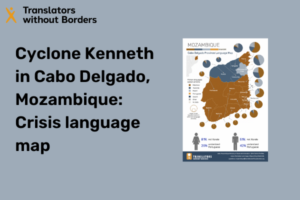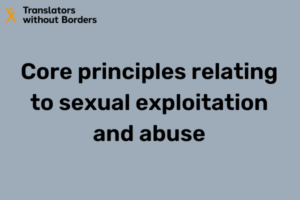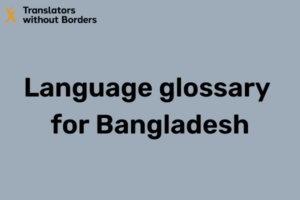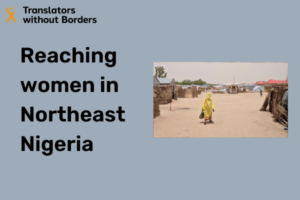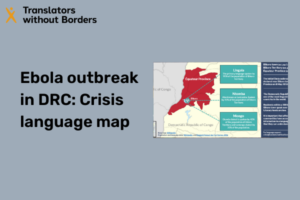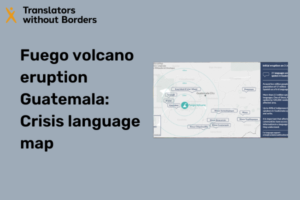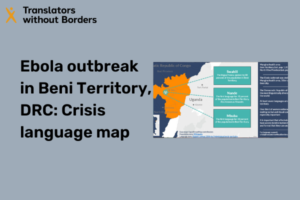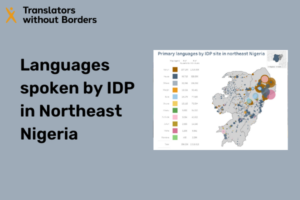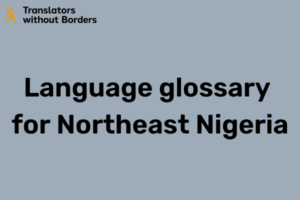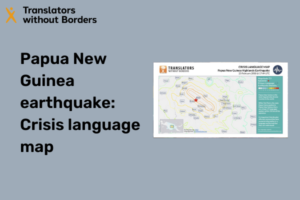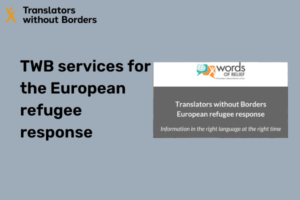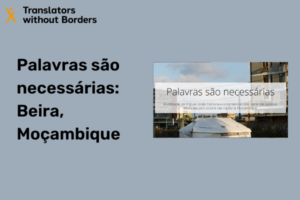Cyclone Kenneth hit the northern part of the country on 25 April 2019, the strongest storm in Mozambique’s recorded history and the second in five weeks. Strong winds, rainfall, landslides, and flooding are expected at the time of writing, endangering lives and livelihoods. In the wake of Cyclone Kenneth, people affected need to obtain critical […]
Translating information to prevent sexual exploitation and abuse
Sexual exploitation and abuse continue to occur in humanitarian contexts worldwide. We believe that language can help prevent it. Preventing abuse starts by making the rules on sexual conduct clear and available in languages people can understand, so everyone knows what is acceptable. The international humanitarian world’s coordination body, the Inter-Agency Standing Committee (IASC), developed […]
TWB glossary for Bangladesh
The TWB glossary for Bangladesh is designed to assist field workers and interpreters working on the Rohingya humanitarian response in Bangladesh. It aims to improve communication between aid workers and the Rohingya community by providing clear and accurate translations of useful terminology that you can carry in your pocket. The text and audio Bangladesh Glossary […]
Comprehension matters: The power of communicating in different languages and formats to reach vulnerable women in Northeast Nigeria
Ebola outbreak DRC — Crisis language map
Carte linguistique en français On 8 May 2018, the government of the Democratic Republic of Congo (DRC) declared an outbreak of Ebola virus in Bikoro, Équateur Province. Preceding the declaration, two cases of Ebola had been confirmed by laboratory testing, and seventeen people had died in the past five weeks of suspected viral hemorrhagic fever. […]
Fuego volcano eruption Guatemala – Crisis language map
Erupción del Volcán de Fuego, Guatemala – Mapa lingüístico de la crisis en español On 3 June 2018, the Fuego volcano, 40 km from Guatemala City, erupted. Preliminary reports from CONRED, the national disaster authority, recorded 65 people killed and close to 2,000 people in shelters. More than 1.7 million people have been indirectly affected by the […]
Ebola outbreak in Beni Territory, DRC – Crisis language map
Carte linguistique en français On 1 August 2018, the government of the Democratic Republic of Congo (DRC) declared an outbreak of Ebola virus in Mangina, North Kivu Province. Four cases of Ebola had been confirmed by laboratory testing, and 20 people had died of hemorrhagic fever in the area. Ongoing insecurity in the area […]
Communications dashboard: Internally displaced people in Northeast Nigeria
This dashboard is an interactive tool to help humanitarian organizations better plan their communication strategies and language support. Developed by Translators without Borders, in cooperation with the International Organization for Migration’s (IOM) Displacement Tracking Matrix (DTM) team in Maiduguri, the dashboard can help aid workers make data-informed decisions to communicate with and support the crisis-affected […]
TWB glossary for Northeast Nigeria
This multilingual glossary is designed to help humanitarian staff, interpreters, and translators working with crisis-affected people in northeast Nigeria. Using consistent, accurate, respectful and easily understood words in local languages is essential when conveying important humanitarian terms and potentially life-saving information. The glossary is organized thematically, with a focus on protection, housing, land and property […]
Papua New Guinea earthquake – Crisis language map
On 25 February 2018, a M7.5 earthquake struck the island of Papua New Guinea, displacing over 26,000 residents and leaving 270,000 people in need of assistance. At least 53 people have died as a result of landslides and structural collapse. Women, men, and children who have had to leave their homes speak a variety of […]
TWB services for the European refugee response
Since September 2015, Translators without Borders has deployed its Words of Relief response program to support local and international humanitarian agencies working to assist refugees and migrants arriving in Europe. Since the response began, Rapid Response Teams in Arabic, Farsi, Greek, Kurdish, and Urdu have provided over 800,000 words of immediate, high-quality translations in multi-media […]
Palavras são necessárias: A utilização de línguas locais melhora a compreensão por parte das pessoas afectadas pelo ciclone Idai na Beira, Moçambique
Leia e faça o download do resumo dos resultados e das recomendações aqui. Também é possível fazer o download deste resumo e do relatório em inglês.
